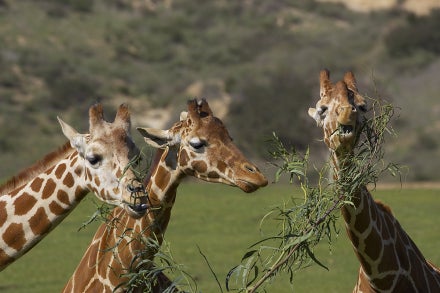
Zoo Internquest is a seven-week career exploration program for San Diego County high school juniors and seniors. Students have the unique opportunity to meet professionals working for the San Diego Zoo, Safari Park, and Institute for Conservation Research, learn about their jobs, and then blog about their experience online. Follow their adventures here on the Zoo’s website!

Even though millions of children dream of becoming a vet, it is well known how difficult it has become to be a veterinarian. With acceptance rates into veterinary schools exceedingly low and acceptance into residency programs even lower, the path to become a veterinarian can often seem daunting and discouraging. This week, interns met with Dr. Meg Sutherland-Smith, Director of Veterinary Services, and Dr. Ben Nevitt, Veterinarian, who have very successfully maneuvered the path to become a veterinarian, and ended up with their own dream at the San Diego Zoo.
Before Dr. Sutherland-Smith began her career at the Zoo in 1990 as a resident, she attended Virginia Tech for her undergraduate degree, obtained her Master's degree, and then began four years of veterinary school under a general curriculum. Dr. Sutherland-Smith would advise that students aspiring to be a zoo veterinarian begin with a general curriculum. She suggested that in order to be a successful zoo veterinarian, a strong foundation in general medicine is required. Dr. Sutherland-Smith’s passion for animals and the diversity of species led her to begin her studies and career in zoological studies, and it was her hope that becoming a zoo veterinarian would allow her to contribute to conservation and, simply, help animals. Dr. Sutherland-Smith’s post-graduate training included two internships with a specialized focus so she could gain experience working with animals. She would highly recommend that those who hope to become veterinarians within a zoo be sure to acquire internships and volunteer at local zoos in order to gain the experience needed while working with a variety of species. While students should also be sure to keep up their grades, even students with a perfect grade point average might not be admitted into veterinary school due to its competitive nature. These internships and outside activities will set one student apart from another.
Dr. Ben Nevitt also strongly advocated for outside volunteer work and internships, the more diverse, the better. He began his path in high school, and worked at a vet clinic as well as shadowed an equine vet. Dr. Nevitt then attended Washington University for his undergraduate degree and obtained his doctorate of veterinary medicine from the University of Florida. After that, he began his three-year residency and two internships at Colorado State University and Illinois State University. To some this schooling might seem excessive, but both Dr. Sutherland-Smith and Dr. Nevitt stressed how a strong and thorough education is critical since zoo veterinarians are “generalists within a specialty field.”
No more was this idea of “generalists within a specialty field” more present than when Dr. Sutherland-Smith first gave us a tour of the Hospital. We went from seeing all the different equipment used for exams to seeing radiographs and CT scans all within the span of a little over an hour. Dr. Sutherland-Smith and Dr. Nevitt really do “do it all” here at the San Diego Zoo, acting as basic veterinarians one day to radiologists the next.
Both Dr. Sutherland-Smith and Dr. Nevitt said that their favorite part of their job is the problem solving that it requires, especially since the issues that they solve help animals. Dr. Sutherland-Smith explained how the most rewarding part of her job in recent memory was her work with giant pandas. Dr. Nevitt mentioned how within the last month he helped a klipspringer, a small antelope, born in the rain at one pound, with not the best chances, make a full recovery. While sometimes their work can be challenging, in Dr. Sutherland-Smith’s words “making a difference in managed care and contributing to conservation” is one hundred percent worth the difficulties that zoo veterinarians might face throughout their career.
Emma, Career Team
Week Two, Winter Session 2019




